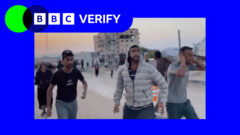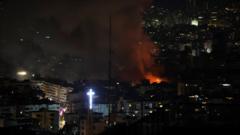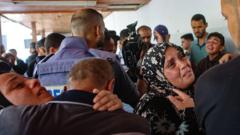**As Israel faces accusations of violating the Geneva Conventions and committing war crimes, international leaders are caught in a moral dilemma that could affect global relations for years.**
**Grave Allegations Against Israel: The World Watches, But Will It Act?**

**Grave Allegations Against Israel: The World Watches, But Will It Act?**
**The ongoing conflict in Gaza raises serious questions about moral responsibility and adherence to international law.**
In the midst of a brutal military conflict, accusations against Israel for potential war crimes are mounting. This contemporary conflict tests the limits of international humanitarian law, with many arguing that Israel's military actions contravene the well-established rules governing warfare. The Geneva Conventions, which were designed to protect civilians during wartime, dictate that all parties must adhere to laws ensuring humane treatment, regardless of circumstances. However, the situation has escalated to alarming levels following the horrific surprise attack on October 7, 2023, where Hamas claimed the lives of over 1,200 Israelis, including hundreds of civilians.
The International Committee of the Red Cross (ICRC), located in Geneva, is a prominent custodian of these conventions, which remain crucial for safeguarding civilians during conflicts. As journalists struggle to gather precise reporting from Gaza amidst deadly conditions, the fog of war obscures the realities on the ground. Since the onset of hostilities, approximately 181 journalists have sacrificed their lives to bring awareness to the situation, with the majority being Palestinian workers unable to operate freely in an area cordoned off by Israeli forces.
Although some context in the fog of war is necessary, it is clear that the battlefield has legal implications that cannot be ignored. Following the shocking attacks from Hamas, Israeli Prime Minister Benjamin Netanyahu’s government has faced criticism for perpetuating a cycle of violence. Critics assert that he has prioritised political survival alongside an ultra-nationalist coalition rather than genuinely seeking peace.
Furthermore, there is mounting concern from Western diplomats regarding potential complicity in future legal repercussions if they remain silent about the humanitarian catastrophe unfolding in Gaza. Reports from the Palestinian health ministry suggest around 54,607 Palestinian casualties and tragic figures related to children, leaving civil society in turmoil amid severe restrictions on food and medical supplies.
Concerns are not solely limited to Gaza; international leaders are also facing pressures at home, as public sentiment shifts regarding support for Israel’s actions. Notably, UK Prime Minister Sir Keir Starmer and French President Emmanuel Macron have expressed disapproval over the escalation of violence, describing it as wholly disproportionate. While recent political dynamics showcase a long-standing allyship between Western powers and Israel, divisions have emerged from the perceived misuse of military force against civilians.
More troubling are the comprehensive discussions regarding allegations of genocide. Reports point to the humanitarian crisis escalating in Gaza, with claims that Israel's systematic targeting of civilians may be driven by a strategy aimed at forcing the Palestinian population to evacuate. Such stark accusations bring a sense of urgency to global discourse on human rights, compelling several governments to consider the potential implications of being perceived as complicit.
The looming question is how international governments will navigate these complexities as evidence mounts against Israel. Some view recent military campaigns as a form of collective punishment against the entire Palestinian population, leading to discussions within the International Criminal Court and the viability of potential sanctions against Israel.
As the war drags on, shared values of humanity are being tested. The persistent focus of the ICRC highlights the importance of an unwavering commitment to the laws governing warfare. While President Netanyahu justifies military actions as self-defense against terrorism, this rationale cannot provide an escape from the legal scrutiny that parties involved in war must contend with.
In a world increasingly accessed via technology, where updates can be shared instantaneously, global citizens and leaders are tasked with reflecting upon their response. How they choose to act could reshape diplomatic relations for years to come—forcing a reckoning between military might and moral responsibility. The haunting echoes of suffering in Gaza demand a response anchored in human dignity and respect for fundamental rights, lest the ongoing tragedy inform future generations of what happens when wars undermine the very values necessary for peace.





















